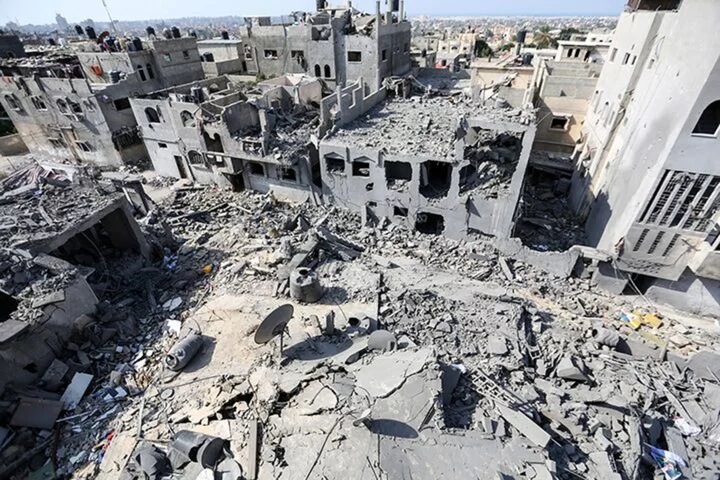More than two weeks since Israel declared war on Hamas and enlisted hundreds of thousands of troops in an unprecedented call-up, there are growing calls inside the country to rethink the scope of a ground invasion that had been expected any day.
People familiar with the discussions of Prime Minister Benjamin Netanyahu’s war cabinet say the pressure comes from numerous concerns: fear that Hezbollah in Lebanon will enter from the north with its missiles, the fate of some 200 hostages in Gaza, and the risk of Israeli military casualties.
This doesn’t mean troops won’t enter Gaza — even perhaps soon — as air strikes continue in the meantime. But the nature of their operation is being reconsidered on a daily basis as some security veterans urge caution that Israel should respond methodically rather than in a rage to avenge the Hamas onslaught of Oct. 7 that left 1,400 Israelis dead.
“No harm is done by waiting with a ground operation,” Yaakov Amidror, a former national security adviser, said on television late Sunday. “Every day that passes benefits us and hurts Hamas, and the more time passes, the less the air force will be needed in Gaza, so it will be possible to move it up north.”
Dismantling Hamas — labeled a terrorist organization by the US and European Union — remains the goal. Defense Minister Yoav Gallant reiterated on Friday that Israel’s ultimate objective is to create a “new security reality” for the region. That, though, requires patience, according to security veterans.
Others say that the longer the ground move is delayed, the likelier it is to shift in nature, becoming more focused on specific targets rather than a broad takeover. Indeed, the word being used increasingly is “maneuver” rather than “invasion.”
Freeing Hostages
Hostage negotiations focused on foreigners and dual nationals are also playing a role. Western governments are pushing Qatar, which has donated huge sums toward infrastructure projects in Gaza and hosts Hamas political leaders, to free those being held.
That would follow the release of two Americans last Friday, brokered by Qatar. The talks are making progress, the people familiar with the situation said. They spoke on condition of anonymity.
Netanyahu, who has been blamed for the Oct. 7 security failure, appears more cautious about the use of troops inside Gaza now than some in the military and defense establishment, the people said. Someone who confers with the Israeli leader said the feeling is that Israel can take its time because its military is hitting Hamas as hard as it’s currently able.
Israel has been bombing Gaza more intensely from the air and with heavy artillery, killing more than 4,500, according to the Hamas-run health ministry. There are signs that Hamas is weakening, the people familiar said, meaning that aerial attacks may continue for longer.
But any ground invasion still carries huge risks for Israeli troops. Hamas is believed to have a network of underground tunnels that hasn’t been destroyed and where militants would be waiting to respond.
US Involvement
The US is playing a significant role in Israeli planning, offering advice and support while gently pushing top officials to confront uncomfortable questions. Those include the consequences of destroying a movement that is political and religious as well as military, and the risk of losing Israel’s new relationships in the Arab world.
The Americans are also warning against too many civilian casualties and pushing for humanitarian aid to enter Gaza, where 2 million Palestinians are trying desperately to avoid being killed. At the same time, the US has stepped up its own military profile in the region, adding two aircraft carrier-based fleets, more anti-missile systems and troops.
Israeli officials say they need to send two distinct, opposite messages: The first is to other Iranian-backed groups, like Hezbollah, to say Israel can act just like them if necessary and force its enemies to pay a terrible price. The other is to Washington and other Western capitals that Israel shares their values on human life and isn’t like the Islamic militants.
“It’s civilization against barbarism,” Netanyahu told Greek Prime Minister Kyriakos Mitsotakis on Monday, one of a parade of visiting dignitaries whose presence has appeared to delay all-out war. “We’re on the side of civilization. We have to unite, all together, against Hamas.”
Another sign that Israel’s leadership is rethinking the ground war comes from the sudden prominence of a military skeptic, Itzhak Brik, a reserve major general and fellow in counter-terrorism at Reichman University north of Tel Aviv. Brik recorded a video a few months ago saying the Israeli military is woefully unprepared for the challenges ahead. He’s opposed to moving troops into Gaza.
Brik was largely ignored, but is now being treated by some as a visionary and met twice recently with Netanyahu, whose supporters have flooded social media with the video. In it, he predicted that Hezbollah would rain 5,000 missiles per day on Israel and send 8,000 troops to occupy the north.
Then, in an eerie forecast of what did happen in the south this month, he added that militants would enter towns and seek to slaughter residents, with the army incapable of stopping them.
It all points to the need for more preparation, and ensuring the US is on board, according to Avi Melamed, a former intelligence officer and author on Arab affairs. “Take your time,” he said by telephone. “There must be coordination between Israel and the United States. It’s very possible this is happening now. But we must be patient.”
--With assistance from Galit Altstein and Gina Turner.









